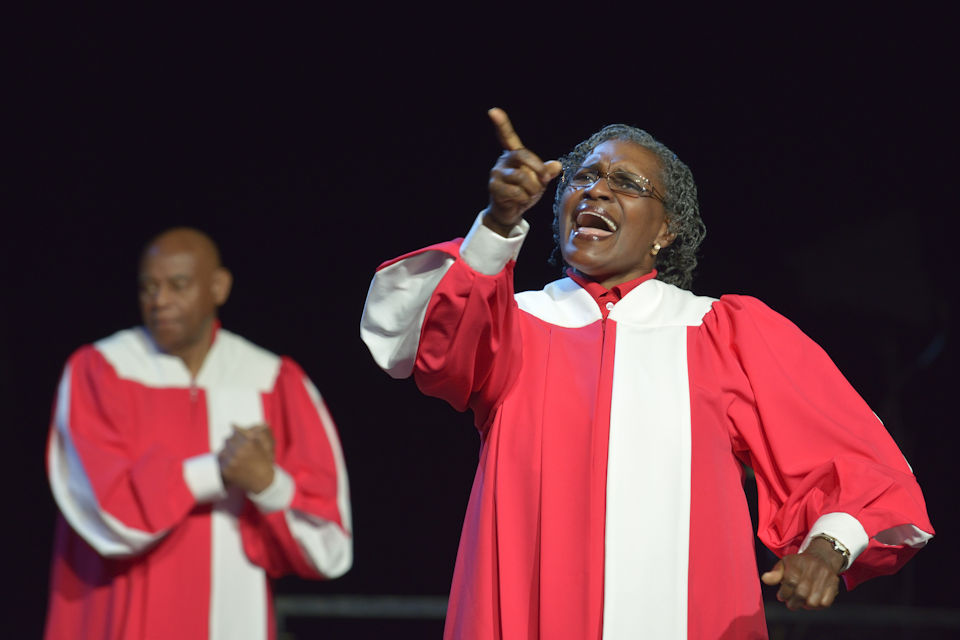It’s a natural assumption that deaf and hard-of-hearing people have no interest in music, writes the Rev. Leo Yates Jr. He encourages churches to consider the musical contributions that community could make to a worship service.
LEO YATES, JR.
Disability Ministries Committee UMC
It might take some imagination to believe that some Deaf and hard-of-hearing people like music. You might even be thinking, if a person cannot hear, how can they hear music? It is a fair question and a natural assumption. Yet, there are indeed some Deaf and hard-of-hearing people with some degree of hearing. Add the loudness, the vibrations, the right acoustics, the dramatization, possible technological amplification, AND sign language; and the music performance can come alive.
Some people wear hearing aids, have a cochlear implant, or use some sort of assisted listening device, while others do not. There are few Deaf and hard-of-hearing people who enjoy hymns, yet there are likely more who do not. A Deaf woman (a preacher’s kid) tells that she used to attend worship with her hearing family, and music was not that interesting to her, because she needed someone to move their finger from verse to verse in the hymnal to know where they were in the hymn (and really indicating for the Deaf woman that the hymn is almost done). Profoundly Deaf, she was unable to hear anything; moreover, she did not get too much out of the hymns sung when she was younger. However, many years later, with more churches incorporating contemporary music with a live band, she was better able to feel the music, when she sat closer to the band while following a sign language interpreter. For her, the music was better experienced.
There are indeed some Deaf and hard-of-hearing people who have spiritual gifts for signing music. They have probably signed music since their youth, and for a few, music was a family value, making it more meaningful. Flo Johnson, a Deaf member of Magothy United Methodist Church of the Deaf in Pasadena, MD, is a longtime musician. Flo and her husband even signed duets together, such as “The Old Rugged Cross.”
Another Deaf member from Magothy, Julia Bosworth, signs music with such ease and poise that one is able to see her spirit connecting with the Spirit. At Christ Church of the Deaf in Baltimore, MD, Catherine Vaccarino was a long-time music director. No one can sign the song “The Lord’s Prayer” quite like Catherine can. LaSander Saunders, who was a part of the ASL team for creating the ASL Glossary through United Methodist Communications, is a former music director. Her spiritual gift was shared most Sundays, even at General Conference and at other venues.
A sign language interpreter generally signs the music in hearing churches with interpreting ministries (Deaf ministries). It may be hit or miss, but for sure, signing music well typically happens because the person signing, whether Deaf or hearing, has been infused with the Spirit to do it. Signing music expressively and with visual assurance takes practice. Since some people lose their hearing later in life, referred to as late-deafened, they may have learned sign language. Late-deafened people may quite enjoy sharing their love of music in a visual way. Keep this in mind with Deaf and hard-of-hearing children and youth as well. Often helpful, Deaf and hard-of-hearing persons will take cues from the hearing sign language interpreter to align with audible music or a hearing choir.
Invite Deaf and hard-of-hearing persons to sign music, possibly during Deaf Awareness Week (last week of September). Giving them the music ahead of time is needed so they can consider how to sign some tricky verses (metaphors), such as “There is a Balm in Gilead” and “God’s gonna trouble the water” (one will not want to use the actual sign “trouble” because it may appear the water is dangerous).
Music spiritually affects hearing people in a positive way, and it can also do the same for Deaf and hard-of-hearing people. Besides adding to a better worshipful experience, the congregation will benefit from the awareness that it brings. More importantly, Deaf and hard-of-hearing people have spiritual gifts, and worship leaders should consider including them even more.
~ Rev. Leo Yates, who has Deaf parents, is an ordained deacon serving in the Baltimore-Washington Conference. For those interested in signing music, contact him at [email protected].
Last Updated on August 3, 2021

